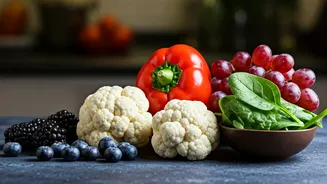Kidney Health Explained
The kidneys are vital organs, working diligently to filter waste and excess fluids from the blood. They also play a crucial role in regulating blood pressure,
producing red blood cells, and maintaining bone health. When kidneys are damaged, it can lead to various health problems. Making informed food choices can significantly support kidney health and may even aid in the repair of damage. Including kidney-friendly foods in your diet can assist the kidneys in their crucial functions, reducing the likelihood of kidney disease and its complications. Understanding the role of the kidneys in bodily functions underscores the need for proactive measures to protect and support them.
Cranberries: A Powerhouse
Cranberries are packed with antioxidants and compounds that can prevent urinary tract infections (UTIs), which, if left untreated, can harm the kidneys. They work by inhibiting bacteria from adhering to the urinary tract walls. Cranberries can be consumed in various forms, including fresh, dried, or as juice. However, it's essential to note that cranberry juice should be consumed without added sugars to maximize its benefits and avoid potential complications. These fruits are easily accessible and relatively inexpensive, making them a practical addition to your diet. Integrating cranberries is a simple yet effective step toward supporting kidney health by protecting against infections that can compromise kidney function.
Red Bell Peppers' Benefits
Red bell peppers are rich in vitamins and low in potassium, making them a good option for kidney health. They provide antioxidants like vitamin C, which combat free radicals that can damage cells. Incorporating these peppers into meals can offer a source of vital nutrients without overburdening the kidneys. Red bell peppers are versatile and can be used in numerous dishes, from salads to stir-fries, enhancing the flavor and nutritional value of your meals. Their low potassium content is particularly beneficial for those with kidney issues, as high potassium levels can put extra stress on the kidneys. Including these peppers is a practical method to improve your diet while safeguarding your kidneys.
Cauliflower: The Versatile Veggie
Cauliflower is another kidney-friendly vegetable that is low in potassium and rich in vitamins and fiber. It aids the body in eliminating toxins, which benefits overall health and decreases the burden on the kidneys. Cauliflower can be consumed in raw, steamed, roasted, or even pureed forms, making it simple to incorporate into various meals. Its versatility and mild flavor make it an excellent choice for individuals who want to enhance their diet with kidney-friendly options without sacrificing taste. Adding cauliflower to your weekly meals offers a nutritious boost that complements the functions of your kidneys, helping them to operate effectively and maintain your overall wellness.
Garlic: A Flavorful Ally
Garlic is a natural anti-inflammatory agent and provides antioxidants that can aid in the prevention of kidney damage. It helps to lower cholesterol levels and aids in blood pressure control, which is essential for kidney health. Garlic can be easily added to various meals, bringing both flavor and health advantages. Using garlic in your cooking can be a simple way to boost kidney protection and boost overall health. Garlic also provides allicin, a compound with antioxidant properties that can improve kidney function and protect against injury. Integrating garlic into your regular diet is a tasty and practical approach to supporting kidney health and improving your general well-being.














